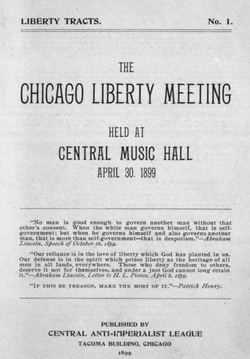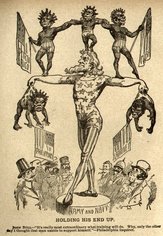Pacifism
War
David Starr Jordan ranks among one of the leading pacifists in US. Jordan's involvement in the peace movement began with his public rejection of imperialism in 1898 after the onset of the Spanish-American War. He served as an an officer for the Anti-Imperialist League, the World Peace Foundation, the American Union Against Militarism, and the Emergency Peace Federation (#1 p. 77). However, his identification as a pacifists is misleading because he was not opposed to war under all circumstances. Although he contended that war should only be used as a last resort, he had little respect for a nation that refused to fight. While Jordan identified as a pacifist, he did so because he viewed its opposite to be a militarist. Jordan could not identify as a militarist because he did not believe in the absolute necessity of war.
David Starr Jordan ranks among one of the leading pacifists in US. Jordan's involvement in the peace movement began with his public rejection of imperialism in 1898 after the onset of the Spanish-American War. He served as an an officer for the Anti-Imperialist League, the World Peace Foundation, the American Union Against Militarism, and the Emergency Peace Federation (#1 p. 77). However, his identification as a pacifists is misleading because he was not opposed to war under all circumstances. Although he contended that war should only be used as a last resort, he had little respect for a nation that refused to fight. While Jordan identified as a pacifist, he did so because he viewed its opposite to be a militarist. Jordan could not identify as a militarist because he did not believe in the absolute necessity of war.

Jordan's opposition to war emerged from a pragmatic worldview. He opposed wars because they destroyed democracies and not because he believed they were immoral. He posited that no nation could maintain its strength and democratic characteristics if it sent its best men to war. His theory of Reverse Social Decay contended that military service and war led to social decay. In a peaceful nation, the virile, strong, and brave would survive, whereas in an aggressive nation, the weak would reproduce. In order to substantiate this point, he claimed that the historic decline of Greece, Italy, France, Spain to their declining racial stock. He also researched the quality of Japanese conscripts after the Japan-Chinese War and concluded that war reduced the stature of incoming army conscripts. His evidence was that in the city of Kanda in 1914, twenty-four percent of the conscripts passed as "strong" on entrance exams whereas in 1915 the percentage lowered to thirteen percent (83 out of 635 instead of 194 out of 813). In 1915, a much higher percentage of those accepted to the army fell in the "average" class (#3). From his research on other nations, he warned that war "limits the future [of nations] rather than checks the present" (# 4 p.26).
Although Jordan identified as a pacifist, he defected from his position and supported US involvement in World War I in April 1917 . However, we should not view this defection as completely uncharacteristic of his pacifist position. He claimed that he was "too devout of a believer in freedom and democracy to accept submission to injustice or tyranny as preferable to war" (#1 p. 84). Jordan realized that all attempts at US mediation from a neutral stance had failed and the United States had to enter the war as a last resort. For him, World War I manifested the inevitable struggle between the governing system of an autocracy and a democracy. He deepened his commitment to the war when he realized that the democratic powers in Europe were incapable of defeating German despotism without assistance from the US (#1 p. 81-83).
Although Jordan identified as a pacifist, he defected from his position and supported US involvement in World War I in April 1917 . However, we should not view this defection as completely uncharacteristic of his pacifist position. He claimed that he was "too devout of a believer in freedom and democracy to accept submission to injustice or tyranny as preferable to war" (#1 p. 84). Jordan realized that all attempts at US mediation from a neutral stance had failed and the United States had to enter the war as a last resort. For him, World War I manifested the inevitable struggle between the governing system of an autocracy and a democracy. He deepened his commitment to the war when he realized that the democratic powers in Europe were incapable of defeating German despotism without assistance from the US (#1 p. 81-83).

Imperialism
In tandem with opposing war, he opposed imperialism. For instance, Jordan staunchly opposed the prospect that the US would annex the Philippines. Once again, his opposition was not on grounds of morality but on grounds that relate to eugenics. If the US annexed the Philippines, he feared that Filipinos would threaten the racial superiority of the Anglo-Saxons through interbreeding in the US. By introducing them as equals into society, they would assimilate and give birth to an inferior strain of people (#1 p. 78). This was inherently threatening to the democratic system because only morally and genetically superior individuals could sustain this form of government. His views on imperialism parallel his hesitation on immigration.
